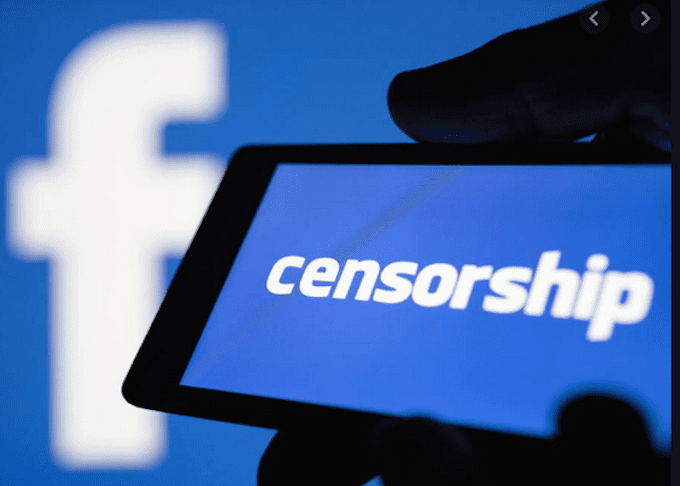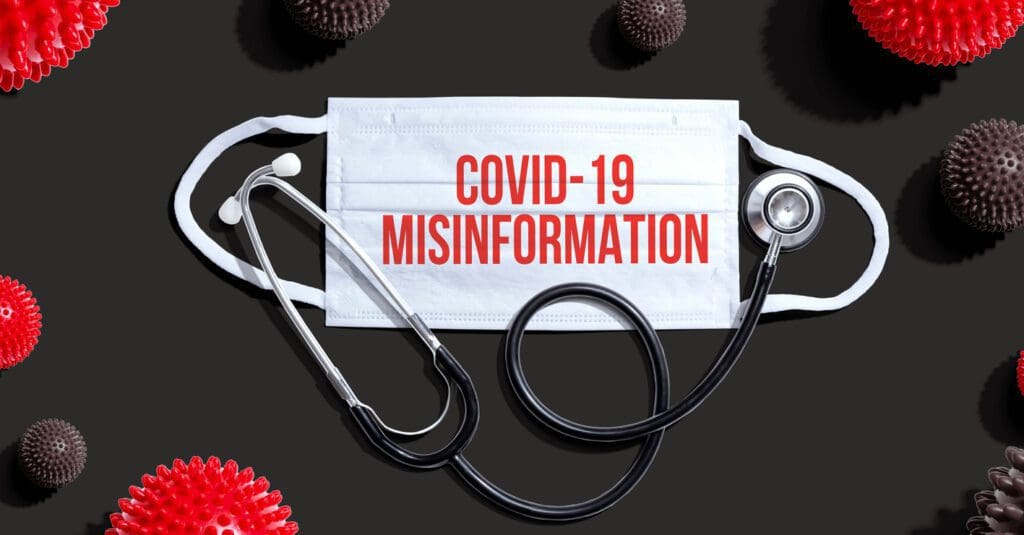

Prof David Livermore’s Response to Facebook’s Request For Feedback on Covid ‘Misinformation’ Policies
David Livermore, a Professor of Medical Microbiology at the University of East Anglia and a regular contributor to this site, has shared his response to Meta’s request for feedback on the COVID-19 ‘misinformation‘ policies of Facebook and its other social media platforms.
To respond, it is necessary first to define ‘misinformation’. The fact that some authority asserts something does not make it so. For decades, sometimes centuries, doctors believed in Galenic humours, chemists in phlogiston and astronomers that the sun orbited the earth. Alchemists deceived themselves that they could transmute base metal to gold. The assertions of religious authorities belong a class of their own. Those who disputed these authorities were castigated as heretics and purveyors of ‘misinformation’. Some were hounded from their professions. Yet they, not the ‘authorities’, proved to be right.
So, let me comment first on Meta’s list of what has been done already and whether it was right or not, then turn to your questions. My responses to the latter flow from the former.
• Meta asked the Board whether it should continue removing content under their current policy or whether another, less restrictive, approach would better align with the company’s values and human rights responsibilities.
A less restrictive approach is appropriate, and always should have been followed, even at the height of the pandemic. It cannot be said too often that the policies adopted with respect to COVID were not those intended before the pandemic. The pre-pandemic plans of the CDC, WHO and Public Health England (for whom I worked from 1997 to 2018) did not advocate lockdowns, and were sceptical of masks [1,2,3]. The envisaged response was one of ‘Keep calm and carry on’, accepting that, as humans, we are prey to occasional respiratory virus pandemics with sizeable mortality, as in 1889-94, 1918-9, 1957-8 and 1968-9.
Yet, in 2020, these long-prepared plans were abandoned overnight and totally different policies (lockdowns, masks, distancing, Test & Trace etc) were adopted. There was no prior evidence – except assertions from a secretive and hostile power (China) – that these novel approaches would prove effective or proportionate.
Accordingly it should always have been legitimate to question and criticise the unorthodox policies adopted, especially given their great cost and predictable collateral damage e.g., to provision of other healthcare, to mental health, to education etc. [4,5,6].
• Meta’s approach to misinformation on its platforms mainly relies on “contextualizing potentially false claims and reducing their reach, rather than removing content. Because it is difficult to precisely define what constitutes misinformation across a whole range of topics, removing misinformation at scale risks unjustifiably interfering with users’ expression.”
This appears to have been Meta’s general pre-pandemic policy, on which I have no comment. The issue is what was done regarding ‘misinformation’ during the pandemic, below.
• Meta states that they began adopting a different approach in January 2020, as the widespread impact of COVID-19 started to become apparent. Meta moved towards removing entire categories of misinformation about the pandemic from its platforms. Meta states that it did this because “outside health experts told us that misinformation about COVID-19, such as false claims about cures, masking, social distancing, and the transmissibility of the virus, could contribute to the risk of imminent physical harm.”
The crux is what constitutes ‘misinformation. On 21st July 2021 President Biden asserted “If you’ve been vaccinated, you won’t get COVID”.[7] Yet cases of vaccine breakthrough infection were well recognised by that date, with a CDC report on 28th May 2021.[8] Failures were discussed at the European Congress of Clinical Microbiology & Infection (the world’s premiere Infection meeting), held from 9-12 July 2021, again preceding President Biden’s claim. Thus, the President’s didactic assertion was wrong, and known to be wrong, at the time it was made. Moreover, it was said with purpose. It therefore unequivocally constituted ‘misinformation’. Yet this is not the sort of ‘misinformation’ that Meta and other social media suppressed…
Rather, suppression of ‘misinformation’ has been reserved for those sceptical of lockdowns, masks, and the efficacy of vaccines. This might have been reasonable if it was clear and well known that lockdowns, masks, and vaccines are highly effective in novel coronavirus pandemics. Yet that was not the case. As already pointed out, the policies of 2020 were adopted ‘on the hoof’. They were not evidence based and, from the beginning, could be expected to cause great collateral damage. It should always have been legitimate to explore, debate, and criticise them. It is unreasonable to call such criticism, ‘misinformation’ simply because it disputes the official narrative.
Take one example – masks. Trial evidence, prior to COVID, was that these gave little or no useful protection against respiratory viruses [9]. The DANMASK trial, during the pandemic, likewise indicated no significant reduction in COVID infections [10]. Another trial, in Bangladesh [11], did suggest fewer infections in the masked, but its design and statistics have been heavily criticised, and the difference in case numbers between the two arms was trivial [12]. Mask mandates have failed, everywhere, to halt rising COVID trends; for recent illustrations, look to Japan and South Korea, where compliant populations wear masks, even outdoors. Yet, since mid-June 2022, COVID cases have risen 15-fold or more [13]. Or look at schools in Fargo vs. West Fargo (USA) where adjacent districts differed in whether pupils were obliged to wear masks, but where there was no difference in COVID incidence among these pupils [14]. Or consider Bavaria, where N95 masks (asserted to be more effective) were mandated, but where case rates followed the same trajectory as in the rest of Germany, where people largely used (useless) surgical masks [15].
In summary, the evidence in favour of masks for controlling SARS-CoV2 is between scanty and non-existent. Moreover, they are uncomfortable, impede communication, interfere with early childhood learning [16] and have created a disgusting street and beach litter, harmful to wildlife [17]. Yet, Meta and other social media took to censoring negative comments on masks as ‘misinformation’ whilst accepting wildly inflated claims of their efficacy without demur.
• According to Meta there was a lack of authoritative guidance at the beginning of the pandemic, which “created an information vacuum that encouraged the spread of rumours, speculation, and misinformation.” Today, people have greater access to information. “While misinformation about COVID-19 continues to exist, data-driven, factually reported information about the pandemic has been published at an astounding rate.”
See above. Governments, except Sweden and a very few others, adopted an untried approach at the beginning of the pandemic. It was and is unreasonable to dub fair criticism of this as ‘misinformation,’ especially when much of the criticism calls simply for the adoption of policies generally accepted and advocated pre-pandemic [1,2,3].
Moreover, much of what was initially disparaged as ‘misinformation’ has later proved to be true, partly true or, at least, eminently plausible: (e.g. on the harms and ineffectiveness of lockdowns [4,5,6]; on the minimal effect of masks [9-15]; on the brief efficacy of vaccines in terms of preventing infection and transmission [18,19]; on the fact that these vaccines are ‘leaky’ in respect of currently-prevalent variants [20]; on rare but severe side effects of vaccines, particularly in boys and young men [21], who are at minimal risk of severe COVID; not to mention the plausibility of a lab escape origin rather than wet market) [22]. Much of what has come from governments and ‘authoritative sources’ has done so through the questionable filter of ‘Nudge Units’, engaged in mass propaganda, often predicated on flimsy evidence and dubious modelling [23]
• Second, the development of vaccines, therapeutic treatments and the evolution of disease variants, means that COVID-19 is less deadly.
True – though a bigger point is that so many of us have now been infected (70% in the UK by Feb 2022, and probably >80% by now [24]) that we’ve co-evolved to ‘live with the virus.
• Finally, Meta states that “public health authorities are actively evaluating whether COVID-19 has evolved to a less severe state.”
See the preceding point: it is partly that the virus has evolved to become more transmissible but less able to cause severe disease, and partly that we’ve developed a protective immune memory through a combination of infection and vaccination. SARS-CoV2 is now, most likely, well on its way to becoming another sort of endemic ‘common cold’ agent, akin to the long established 229E, HKU1, NL63 and OC43 coronaviruses.
• Meta strongly supports taking a global approach, rather than adopting country or region-specific approaches.
Maybe so. But you must accept that diversity of approach exists among countries, leading to legitimate questions of what is ‘right’.
A few examples. Sweden eschewed lockdowns and mask mandates, faring no worse than countries that imposed them [13]. Were they right?They accrued less collateral damage. Florida stopped lockdowns early, with no worse outcomes than most other US states with more draconian policies, despite a large elderly population [13]. Were they right? Denmark recently stopped vaccinating healthy children and has stopped boosters for the under 50s [25]. Florida, unlike many other US states, is not recommending vaccination for healthy children [26]. Are they right? Children are at minimal risk from COVID but boys, in particular, are at some measurable risk of vaccine-induced myocarditis [21]. At the other extreme (madly in my view) China continues to pursue lockdowns a l’outrance.
Five years hence, once the virus has ‘bedded-in’ to the human population, once total (not just COVID) mortality trends have returned to normal, once the full collateral damage has been tallied, historians and epidemiologists will be able to take a reasoned view of which countries fared well and which fared badly. Until then there is uncertainty and Meta, along with other platforms must accept and reflect this.
The only items that should be flagged ‘misinformation’ are egregious nonsense (e.g. the vaccines contain little green men controlled from 5G masts) or simple assertions that are demonstrably untrue (see Biden, above).
Turning now to your questions. The answers come from the points stressed above.
• The prevalence and impact of COVID-19 misinformation in different countries or regions, especially in places where Facebook and Instagram are a primary means of sharing information, and in places where access to health care, including vaccines, is limited.
It is wrong and unethical (possibly racist too) to treat the citizens of these places as children to be manipulated in a paternalistic manner. They are adults with reason and agency. Where there is diversity of opinion, they should have access to it. Only the most egregious nonsense should ever be censored. Otherwise, in time, Meta will indubitably find yourselves in the hole of having censored what transpires to be true, harming your own reputation.
• The effectiveness of social media interventions to address COVID-19 misinformation, including how it impacts the spread of misinformation, trust in public health measures and public health outcomes, as well as impacts on freedom of expression, in particular civic discourse and scientific debate.
Please see all discussion above on what is ‘misinformation’. Do not confuse ‘misinformation’ with honest debate and dispute. Do not presume that the majority, or the ‘the authorities are right. Remember that very many established medics and scientists, myself included, signed the Gt Barrington Declaration [27], advocating a more traditional response to the pandemic, not the unorthodox, costly, and untested one adopted, which never enjoyed the total support suggested by Meta’s censorship
• The use of algorithmic or recommender systems to detect and apply misinformation interventions, and ways of improving the accuracy and transparency of those systems.
These should (preferably) be abandoned. Alternatively, they should be applied even-handedly to all questionable statements – i.e., someone saying “Vaccines are useless” should be reminded that mortality among the heavily vaccinated elderly in S Korea has been far less than for the same age cohort Hong Kong, with low vaccination rates [28] … Equally someone boasting “I’m getting vaccinated to protect granny” should be reminded that vaccine-mediated protection against infection lasts only briefly and is followed by phase with a high likelihood of infection [18,19,20]. If the latter poster instead caught COVID, they’d develop a more durable immunity. Granny’s ‘protection’ won’t be much different either way [29].
• The fair treatment of users whose expression is impacted by social media interventions to address health misinformation, including the user’s ability to contest the application of labels, warning screens, or demotion of their content.
Again, this comes down to the issue of what is ‘misinformation’. The label should be used extremely sparingly and never in the context of topics that are genuinely arguable.
• Principles and best practice to guide Meta’s transparency reporting of its interventions in response to health misinformation.
Be very careful of calling anything ‘misinformation’ because it does not conform with the prevailing views of officialdom. Copernicus, Galileo, Semmelweis were condemned as purveyors of ‘misinformation’ by those more powerful than themselves. Yet they were right.
Be alert to the fact that some of officialdom’s views (e.g., apropos masks) been prone to sudden change; or has been proven wrong and inaccurate (and therefore to be ‘misinformation’) by subsequent events. Examples include the exaggerated optimism about vaccine efficacy in terms of preventing infection and transmission,’ also a vast amount of ‘predictive’ modelling.
Accept that there is much uncertainty with any new disease, that the response to COVID was unprecedented and untested, that scientific and medical knowledge accrues tortuously along a zig-zag pathway. Be very careful not to censor any view about which there is reasonable debate. Or – if you must censor – do so to egregious claims on both sides of the discussion.
Lastly, be humble and never forget Lord Melbourne’s salutary dictum: “What all the wise men promised has not happened, and what all the damned fools said would happen has come to pass.” Sometimes it works out like that …
1 https://www.dhs.gov/sites/default/files/publications/cikrpandemicinfluenzaguide.pdf
2 https://www.who.int/publications/i/item/non-pharmaceutical-public-health-measuresfor-mitigating-the-risk-and-impact-of-epidemic-and-pandemic-influenza
3 https://assets.publishing.service.gov.uk/government/uploads/system/uploads/attachment_data/file/213717/dh_131040.pdf
4 https://sites.krieger.jhu.edu/iae/files/2022/01/A-Literature-Review-and-Meta-Analysis-of-the-Effects-of-Lockdowns-on-COVID-19-Mortality.pdf
5 https://psychiatry.news/2022-02-22-uk-doctors-warn-of-mental-health-pandemic.html
6 https://www.gov.uk/government/news/ofsted-children-hardest-hit-by-covid-19-pandemic-are-regressing-in-basic-skills-and-learning
7 https://www.washingtonexaminer.com/opinion/biden-said-if-you-get-vaccinated-you-wont-get-covid
8 https://www.cdc.gov/mmwr/volumes/70/wr/mm7021e3.htm
9 https://www.cebm.net/covid-19/covid-19-masks-on-or-off/
10 https://pubmed.ncbi.nlm.nih.gov/33205991/
11 https://pubmed.ncbi.nlm.nih.gov/34855513/
12 https://stevekirsch.substack.com/p/bangladesh-study-proves-masks-dont
13 https://www.worldometers.info/coronavirus/
14 https://www.researchsquare.com/article/rs-1773983/v1
15 https://swprs.org/face-masks-and-covid-the-evidence/
16 https://www.medrxiv.org/content/10.1101/2021.08.10.21261846v1.full.pdf
17 https://www.anguillesousroche.com/nature/limpact-devastateur-des-dechets-covid-19-sur-la-faune-sauvage-de-la-planete/
18 https://www.nature.com/articles/s41467-022-30895-3
19 https://pubmed.ncbi.nlm.nih.gov/34614327/
20 https://pubmed.ncbi.nlm.nih.gov/34873578/
21 https://www.preprints.org/manuscript/202208.0151/v1
22 https://thebulletin.org/2021/08/how-covid-19s-origins-were-obscured-by-the-east-and-the-west/
23 https://www.lauradodsworth.com/a-state-of-fear
24 https://www.gov.uk/government/statistics/coronavirus-covid-19-infection-survey-technical-article-cumulative-incidence-of-the-number-of-people-who-have-tested-positive-for-covid-19
25 https://sst.dk/da/corona/vaccination
26 https://www.floridahealth.gov/newsroom/2022/03/20220308-FDOH-covid19-vaccination-recommendations-children.pr.html
27 https://gbdeclaration.org
28 https://empirefinancialresearch.com/articles/covid-in-hong-kong-why-china-is-vulnerable-omicron-remains-highly-lethal-for-unvaxxed-people-who-havent-had-covid
29 https://pubmed.ncbi.nlm.nih.gov/35380632/







